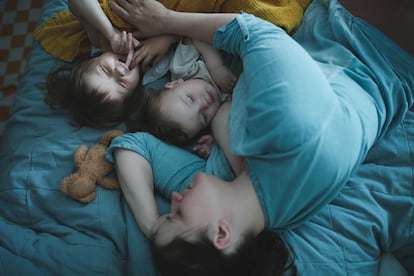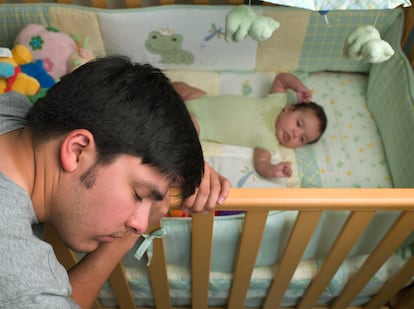How to deal with parental burnout
Parents experience chronic stress because they neglect themselves, leading to long-lasting dissatisfaction, exhaustion and emotional distancing

Everyday life with children is exhausting and demands a lot of energy. So much so, that a specific term has been coined for it: burnout syndrome or parental burnout. This situation stems from overlooking personal needs, like adequate rest. “There are times when parents struggle to manage their emotional, mental and physical well-being because of overwhelming chronic stress that they can’t handle,” said psychologist Tristana Suárez.
People with this syndrome are caught in a cycle where they struggle to rest or find satisfaction in daily life. “Feeling exhausted and overwhelmed by life is often linked to feeling a crushing burden of responsibility,” said Suárez. Parenting just becomes too much for these parents. “They see it as a part of life that doesn’t bring much joy, almost like a tough boss who is always demanding something and never gives back.”
Suárez says various things can lead to parents experiencing burnout. “Working extra hours outside the home, like moonlighting, can leave you so drained by the time you get back that it’s hard to give your kids the attention they need. They need more than just the basics like baths and dinner — they need you.” In such situations, family harmony becomes challenging and harms the parent-child relationship. Suárez says there’s a cumulative effect that leads to growing frustration, especially when there are other stresses like financial issues, lack of support, no social network, and major challenges like a child’s illness.
What does parental burnout look like?
Parents with burnout have certain symptoms. “Feeling tired all the time, getting easily irritated, impatience, and dealing with sleep issues can really strain how you connect with your kids,” said Suárez. But how does this affect the children? “The child is easily frustrated because the parents are less present. They become more demanding and aggressive, seeking from their parents what they need but don’t receive.” The children can also exhibit other attitudes and behaviors. “They can become overly obedient or submissive, as they realize asking more from their parents won’t produce results, leading to disengagement.”

What’s a burned out parent to do?
Darío Fernández, a family doctor, child care provider and clinical psychologist, offers the following guidelines to help burned-out parents:
- Recognize the importance of self-care. Make sure to rest and create a personalized plan.
- Acknowledge your emotions and express them calmly.
- Don’t feel guilty about taking time for yourself because it’s not selfish — it’s crucial for your mental and physical recovery.
- Avoid stressful situations.
- Involve other family members in childcare so you can take breaks.
- Share feelings with your partner and carve out time for each other.
- Prioritize a healthy lifestyle with good sleep and diet, and add daily activities like yoga and sports for stress relief.
- Remember, nobody’s perfect. Doing your best is enough.
- Accept that you can’t control everything in your relationship with your children.
- Encourage independence by letting children do things for themselves.
Are there specific characteristics that make parents more prone to burnout ? “Certain personality traits can make someone prone to burnout syndrome,” said Fernández. “Things like downplaying successes, amplifying failures, being overly perfectionist and highly self-critical, believing nothing you do is good enough.” He says people with parental burnout usually have low self-esteem. “They take failures personally, overlooking external factors beyond their control, leading to feelings of ineffectiveness and guilt for not meeting expectations.”
Fernández says people with these traits have difficulty setting limits because it’s hard for them to say no to their children and they manage their emotions poorly. Parents experiencing burnout syndrome go through several phases. “It doesn’t happen overnight, but there’s a journey that begins with an enthusiasm for parenting,” said Fernández. “Later on, you begin to feel overwhelmed and frustrated, followed by feelings of helplessness, apathy and emotional distancing.”
Sign up for our weekly newsletter to get more English-language news coverage from EL PAÍS USA Edition
Tu suscripción se está usando en otro dispositivo
¿Quieres añadir otro usuario a tu suscripción?
Si continúas leyendo en este dispositivo, no se podrá leer en el otro.
FlechaTu suscripción se está usando en otro dispositivo y solo puedes acceder a EL PAÍS desde un dispositivo a la vez.
Si quieres compartir tu cuenta, cambia tu suscripción a la modalidad Premium, así podrás añadir otro usuario. Cada uno accederá con su propia cuenta de email, lo que os permitirá personalizar vuestra experiencia en EL PAÍS.
¿Tienes una suscripción de empresa? Accede aquí para contratar más cuentas.
En el caso de no saber quién está usando tu cuenta, te recomendamos cambiar tu contraseña aquí.
Si decides continuar compartiendo tu cuenta, este mensaje se mostrará en tu dispositivo y en el de la otra persona que está usando tu cuenta de forma indefinida, afectando a tu experiencia de lectura. Puedes consultar aquí los términos y condiciones de la suscripción digital.









































